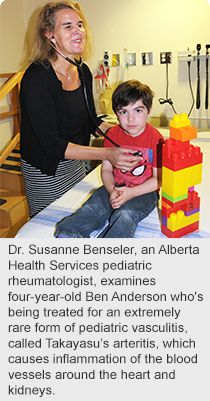
June 30, 2015
Story by Greg Harris; photo by Paul Rotzinger
CALGARY – When four-year-old Ben Anderson came to Alberta Children’s Hospital for routine day surgery this year, his parents had no idea they were at one of the top facilities in the world for the diagnosis and treatment of pediatric vasculitis, which is inflammation of the blood vessels.
In fact, his parents had never even heard of pediatric vasculitis.
During pre-operative testing, physicians found Ben’s blood pressure was inexplicably and dangerously high. His surgery was cancelled and he was admitted to the intensive care unit for a series of diagnostic tests.
 “It was pretty scary,” recalls Ben’s mom, Shannon. “At one point, his blood pressure got up over 200 and no one could figure out why. Doctors were talking about all sorts of things, including the possibility of a tumour somewhere, which is a hard thing for any parent to hear.”
“It was pretty scary,” recalls Ben’s mom, Shannon. “At one point, his blood pressure got up over 200 and no one could figure out why. Doctors were talking about all sorts of things, including the possibility of a tumour somewhere, which is a hard thing for any parent to hear.”
After seeing the results of an MRI scan, Dr. Susanne Benseler, an Alberta Health Services pediatric rheumatologist, knew Ben had an extremely rare form of pediatric vasculitis called Takayasu’s arteritis, which causes inflammation of the blood vessels around the heart and kidneys.
“We’re learning more and more that vasculitis in children – although still rare – is more common than previously thought,” says Dr. Benseler, who is a member of the Alberta Children’s Hospital Research Institute.
“It is also often likely a hidden factor underlying other medical conditions, such as pediatric stroke. Early recognition and treatment rescues the affected blood vessels, and it prevents the spread of the disease and damage to organs such as the brain, heart or kidneys.”
Thanks to Dr. Benseler, Alberta Children’s Hospital is part of an international network of researchers who are pooling their knowledge about the diagnosis and treatment of this rare disease in children.
“We know that we can improve the outcomes for children with vasculitis, but the challenge for physicians is that there often aren’t any signs of illness until there is already significant organ or tissue damage. And, by that point, the outcomes can be devastating.”
Because it tends to affect an isolated part of the body, such as the brain or kidneys, it’s easy for doctors to focus on potential illnesses affecting a specific organ when the problem might be with the vascular system.
“Almost any pediatric physician could potentially see a child with vasculitis. Something like a hearing loss could be caused by vasculitis, for example,” she says.
One area researchers are currently focused on is in developing a blood test to screen for vasculitis. Ben, like other patients enrolled in the research network, has provided a small blood sample so that researchers might be able to pinpoint common biomarkers in patients with the disease.
“We feel so incredibly fortunate that we came here to Alberta Children’s Hospital,” says Ben’s dad, Tyler.
“There were never any indications from Ben that anything at all was wrong. It’s amazing to think of all the things that lined up so that we could find out there was a problem, and then be in a place where doctors could identify the problem and treat it.”
Dr. Benseler estimates there are probably only about 60 to 80 children in Canada with the type of vasculitis Ben has.
Today, Ben’s blood pressure and the inflammation in his blood vessels are being brought under control. In the long term, physicians and his parents hope his disease will go into remission but, even if it does, he’ll need to monitor it for the rest of his life.
Dr. Benseler moved to Calgary in 2013 from Toronto, where she established a systemic vasculitis clinic and a clinic for children with inflammatory brain diseases. She is the principal investigator of the international network, Brainworks, in which clinician scientists from around the world share their knowledge on vasculitis of the brain and spinal cord.
She is also the co-lead for the Pediatric Vasculitis Initiative, an effort similar to Brainworks but that also looks at inflammation of blood vessels in vital organs such as the lungs, heart and kidneys.
Dr. Benseler says Calgary can be rightly called a “powerhouse” of inflammation research, with scientists like Drs. Marvin Fritzler, Paul Kubes and members of the inflammation team at the Alberta Children’s Hospital making significant contributions to our basic understanding of the illness.
Alberta Health Services is the provincial health authority responsible for planning and delivering health supports and services for more than four million adults and children living in Alberta. Its mission is to provide a patient-focused, quality health system that is accessible and sustainable for all Albertans.
-30-